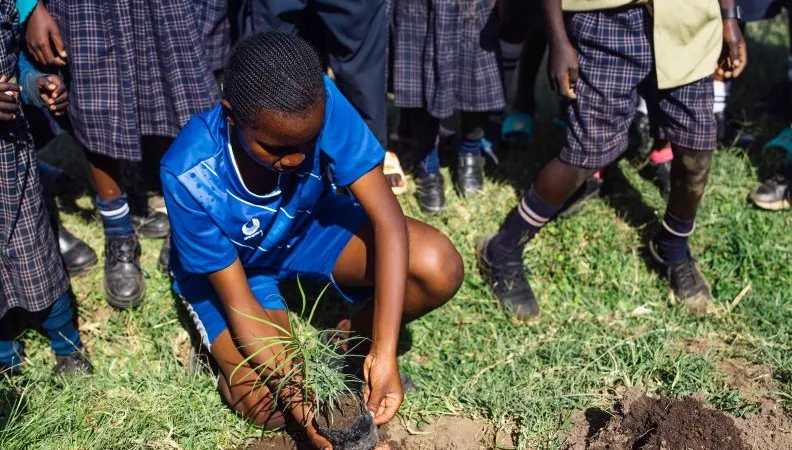Share the page
Biodiversity: what are "nature-based solutions"?
Published on

From food and health to climate action, nature offers effective, low-cost, and sustainable solutions to many of today’s societal challenges. Agence Française de Développement (AFD) is particularly attentive to nature-based solutions (NbS) in the projects it supports.
The Kunming–Montreal Global Biodiversity Framework, adopted in 2022, confirmed the key role of nature-based solutions in addressing today’s global challenges. These solutions are expected to "restore, maintain, and enhance nature’s contributions to people, including ecosystem functions and services such as air, water, and climate regulation; soil health; pollination; disease risk reduction; and protection from natural hazards and disasters."
Miracle solutions?
For 4.5 billion years, our planet has developed a dynamic and resilient balance – a wellspring of solutions and a powerful source of innovation. Take mangroves, for example: these coastal ecosystems not only store large amounts of CO₂, but also provide habitat and resources for countless species, curb coastal erosion, and reduce tsunami risks.
Yet these solutions remain widely underused. Why?
A lack of supportive regulations and standards, limited technical capacity and knowledge, and perceptions that these solutions are riskier than traditional “grey” infrastructure – and insufficient funding.
Nature: our best ally
When facing major global threats – climate change, biodiversity loss, water scarcity, epidemics, or food insecurity – nature remains our best ally. In fact, nature-based solutions could provide more than one-third of the emissions reductions needed by 2030 to have a two-in-three chance of limiting global warming to below 2 °C.
"A less costly alternative in the long run"
"These flexible, adaptable solutions also help avoid the environmental damage often caused by conventional engineered infrastructure. They allow for actions that can be adjusted to climate uncertainty. And by design, they integrate biodiversity as a key objective," explains Pauline Teillac-Deschamps, biodiversity project team lead at AFD.
"What’s more, nature-based solutions often represent a less costly alternative over the long term."
According to the International Union for Conservation of Nature (IUCN), the ecosystem services provided by nature-based solutions to fight climate change could generate $170 billion in global benefits.
From concept to action
The concept was first highlighted by IUCN in 2009 at the COP15 climate summit in Copenhagen, Denmark, to promote stronger integration of ecosystem preservation into the climate agenda. It has since spread through a growing number of pilot projects – from reforestation and sustainable urban development to the restoration of coastal ecosystems such as dunes, lagoons, coral reefs, and mangroves – each demonstrating the value of these solutions in action.
AFD has long supported nature-based solutions
AFD has been promoting nature-based solutions for many years, but their integration into projects has significantly expanded since 2021, with a focus on aligning climate and biodiversity objectives. AFD has notably provided financial support to the International Union for Conservation of Nature (IUCN) through the France–IUCN partnership to help develop its Global Standard. This standard offers a shared framework that enables project developers and investors to more easily design and identify high-quality nature-based solution projects, while also helping harmonize practices across the field.
"In line with the Kunming–Montreal Global Biodiversity Framework, AFD aims to better integrate these solutions across all sectors of its operations by systematically assessing their relevance during the feasibility studies of supported projects," says Pauline Poutrain, climate and biodiversity expert at AFD.
In the Pout region of Senegal, for example, AFD Group has financed a €6 million project to deploy nature-based solutions that improve groundwater recharge. These include windbreak hedgerows to preserve moisture in agricultural soils, the development of agroecological practices, and the restoration of vegetation along waterways.
Mobilizing the private sector
To help scale up this type of initiative, AFD joined the Asian Development Bank’s Nature Solutions Finance Hub in 2024.
"This initiative will pool efforts to develop high-impact projects in Asia and the Pacific by creating innovative financing mechanisms that engage the private sector, and by sharing best practices and lessons learned among hub partners and governments," explains Pauline Poutrain.
AFD is also investing in research through its Ecopronat program for a pro-nature economy. Focus areas include wetland restoration and management in Uganda, the deployment of urban projects based on case studies in Rwanda and Ethiopia, and scaling up projects in Latin America.
